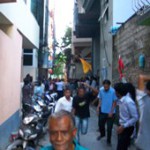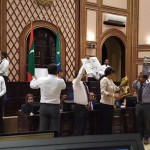Umar Naseer, leader of the Islamic Democratic Party, unveiled his presidential campaign and manifesto last Friday, on his 40th birthday.
Having just submitted 5000 more signatures to the Elections Commissioner, he has big ambitions for himself and his party. His twelve point manifesto prescribes democracy with conservative and Islamic values for the Maldives, the construction of four new regional cities, and tough measures on drugs.
A former police officer, with an imposing physique and a sharp stare, he acknowledges that he is a “self-styled hard man.â€
When asked if his manifesto seems “slightly dictatorial,†he says: “It is…not, it is, I would say these are measures that you need in time.â€
Torture
Dealing with the allegations of torture that have marred his political career, he says: “For everybody there will be an allegation. In my case I have been a police officer. I think I have been a police officer who is tough. I am not a soft cop, I am a tough cop and my policies are that I will stop criminals by using all the authorities given.
“And the allegation on me is that I have broken the backbone of some Mahir or some fellow. My response to that has always been that I have always maintained that Mr Mahir is a drug dealer. He has been sentenced to prison for over 18 years on those same charges. By his own confession he is a drug dealer, a drug addict. And to stop such people cops have to react and under my command my contingents have reacted to arrest him and on my order he has been arrested.
“But I have never ordered anyone to break his backbone and myself personally I have never done anything to anybody…I did not do it all and I am ready to take oath. Placing my hand on the Koran I am ready to take oath. I am doubtful that Mahir will be able to take the same oath on the same Koran,†he says.
But he says the Maldivian Democratic Party’s claim that torture has been rife in the Maldives Police Service during his time in the organisation is “baseless†and “pure propaganda.†When asked about the Evan Naseem killing, he retorts: “Evan Naseem, of course, it is not only in Maldives that you have these kind of isolated matters in police prisons.
“That allegation is going to continue always because MDP has a strategy of overthrowing the government by taking away the police authority. This is a very common thing in communism. When communism came to the world, the communist infiltrators tried to discredit the police and the army so that the army and the police cannot react and then they will attack the government officials and then take over the government.
“So the same tactic today is being used by MDP to make sure the authority of the police is reduced so they don’t react when they go and try and topple the government. I am a trained intelligence officer, and I know how they do it, and how the communists did it in other countries and what are the tactics of MDP today,†he claims.
Drugs
“I will still be tough on drug dealers like Mahir. I have no regret in arresting him and further in future if I have the position of the Presidency, I will not only arrest Mahir, I will arrest all drug dealers and make sure I clean up the streets,†says Mr Naseer.
One of the main points of the IDP manifesto is its hard stance on drugs. “Today we need some tough policies on certain areas, especially on drugs, because the whole Maldives would cease to exist in a hundred years if we don’t stop this,†he says.
“I would take the example of Botswana. 40% of the citizens are HIV positive so 20 years down the line if 40% of Maldivians are drug addicts, what would be the result? I am sure another country would come and take over Maldives,†he claims.
Mr Naseer prescribes some harsh penalties for drugs – death sentence for importers, ten years imprisonment for dealers and confiscation of all their property. The money made from the confiscation will then go into an anti-drug fund. Rehabilitation will be compulsory, and nobody will be above the law, in Mr Naseer’s vision of the Maldives.
Religion
He believes that his conservative and tough policies will be attractive to the average Maldivian. “We believe that if we are able to present the manifesto to the grass roots, it will have a very good reception,†he says.
Mr Naseer says that as a 100% Muslim country, the Maldives is in a rare situation shared only by Saudi Arabia, and so it requires a special version of democracy. Secularism, pluralism, homosexuality, abortion and alcohol are all out, and national unity will remain “a very important priority.â€
“Secularism is not something for Maldives. Secularism is a pill. It is a medicine, very good for countries with multi-race, multi-religion, multi-culture. But if this pill is given to a wrong patient, like Maldives, where we have a single religion for the past 400 years, then this pill can cause irritation in your stomach. So this secularism is not good for Maldives.
“We want to retain one religion, one race, and one language policy. That means was all speak in Dhivehi, we all belong to our race, and then we have one religion.
“I am sure all the political parties would agree with me on these points but the question I show committed are people when you have to really defend that,†he says.
But in the religious society of the Maldives, Mr Naseer believes there should be less political influence on the scholars, and intends to make religious advisory bodies independent. He also believes the scholars should be free from the influence of fundamentalism.
“I think religious radicalism is going to be a serious problem to the Maldives after narcotics – religious fundamentalism I call it. I am sure it is going to be a very serious problem for the Maldives and this is why you need a very tough person for the next president. The next president cannot be a soft guy.
“What we have to do is we have to draw a line that they cannot pass. And when they pass the line we have to punish them…the problem with the current government is that they don’t punish people when they cross the lines.
“The law is not being followed today. The law is being applied on certain people and certain people are let go. Recently there was a murder in Himandhoo, based on religious fundamentalism. The case still has not been looked into correctly. Nobody has been charged in court today. That means there isn’t a real focus by the government on this issue at the moment. The focus of the government today is on the opposition and surviving itself, but these kind of things are coming up, you know,†he says.
Cities
It is clear Mr Naseer is thinking long-term, and his policy of building four new cities in each corner of the country reflects that. “I am sure that within ten years each city will have at least 10 000 population,†he says.
“I am pretty confident I can raise enough money to do this. I need $200m to build four cities and if I take this $200m from any foreign organization for a period of thirty or forty years I am sure it will be worth it because for the 100 islands that I propose to reduce from the map I do not have to spend on those 100 islands. Now I only have 4 cities.
“All the previous governments have attempted to decentralize, but they have failed because their policies were not adequate to do that, so now we are laying a policy which is strong and tough,” he says.
Each family rehoused will get a new property worth Rf. 400 000. To reduce overcrowding in Malé, Naseer is also proposing the construction of 4 000 new flats in 5 years which will be built on Hulhumale and Vilingili and Malé as well as the new capitals.
To pay for it, he proposes a fuller tax system, which will include income tax, tax on profit and zakat. He also plans to cut back on presidential expenses, the military and the bloated civil service.
In order to help make Maldives’ economy more robust, the IDP plans to introduce industrial scale aquaculture, using Japanese expertise, and plans to expand the tourism industry in “a carefully organised manner.â€
Mr Naseer now has a year to generate the “grass-roots†support he talks of for his party, and put the allegations of torture behind him, if he is to become president, and be able to implement his vision.
 (0)Dislikes
(0)Dislikes (1)
(1)




